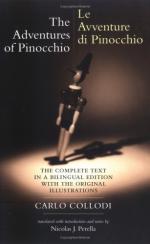The Manager bowed and then turned to Pinocchio and said: “Ready, Pinocchio! Before starting your performance, salute your audience!”
Pinocchio obediently bent his two knees to the ground and remained kneeling until the Manager, with the crack of the whip, cried sharply: “Walk!”
The Donkey lifted himself on his four feet and walked around the ring. A few minutes passed and again the voice of the Manager called:
“Quickstep!” and Pinocchio obediently changed his step.
“Gallop!” and Pinocchio galloped.
“Full speed!” and Pinocchio ran as fast as he could. As he ran the master raised his arm and a pistol shot rang in the air.
At the shot, the little Donkey fell to the ground as if he were really dead.
A shower of applause greeted the Donkey as he arose to his feet. Cries and shouts and handclappings were heard on all sides.
At all that noise, Pinocchio lifted his head and raised his eyes. There, in front of him, in a box sat a beautiful woman. Around her neck she wore a long gold chain, from which hung a large medallion. On the medallion was painted the picture of a Marionette.
“That picture is of me! That beautiful lady is my Fairy!” said Pinocchio to himself, recognizing her. He felt so happy that he tried his best to cry out:
“Oh, my Fairy! My own Fairy!”
But instead of words, a loud braying was heard in the theater, so loud and so long that all the spectators—men, women, and children, but especially the children—burst out laughing.
Then, in order to teach the Donkey that it was not good manners to bray before the public, the Manager hit him on the nose with the handle of the whip.
The poor little Donkey stuck out a long tongue and licked his nose for a long time in an effort to take away the pain.
And what was his grief when on looking up toward the boxes, he saw that the Fairy had disappeared!
He felt himself fainting, his eyes filled with tears, and he wept bitterly. No one knew it, however, least of all the Manager, who, cracking his whip, cried out:
“Bravo, Pinocchio! Now show us how gracefully you can jump through the rings.”
Pinocchio tried two or three times, but each time he came near the ring, he found it more to his taste to go under it. The fourth time, at a look from his master he leaped through it, but as he did so his hind legs caught in the ring and he fell to the floor in a heap.
When he got up, he was lame and could hardly limp as far as the stable.
“Pinocchio! We want Pinocchio! We want the little Donkey!” cried the boys from the orchestra, saddened by the accident.
No one saw Pinocchio again that evening.
The next morning the veterinary—that is, the animal doctor—declared that he would be lame for the rest of his life.
“What do I want with a lame donkey?” said the Manager to the stableboy. “Take him to the market and sell him.”




